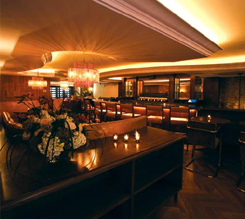Josh Ozersky Still Doesn’t Get It
 Thursday, June 24, 2010 at 08:07AM
Thursday, June 24, 2010 at 08:07AM Last week, Josh Ozersky published an article on Time.com, Great Wedding Food: Tips from a Newly Married Critic.
The premise of the article is that, in lieu of traditional catering—which he says is almost always terrible—you should arrange for local chefs to each bring one dish:
That was my thought, and I put it into action with immense success. I cherry-picked my favorite dishes from half a dozen restaurants. . . .
Everybody got to do their best work, nobody was forced to carry the whole load, and since all the contributing chefs were invited to the wedding, they got to feel a well-earned pride at seeing their peers ravenously tear apart the dishes they (or in most cases, their underlings) had so carefully constructed. Out of so much destruction, my bride and I created the happiest possible memory, and all the guests got to eat their fill at the greatest wedding banquet ever thrown.
So here’s my advice to anyone who is starting to plan a wedding: Forget the caterer! Plug directly into the source of your hometown’s culinary delights, and happiness, enduring and radiant, will immediately follow.
The article went largely unnoticed until Village Voice restaurant critic wrote a blistering indictment, criticizing Ozersky for failing to disclose whether he paid fair market value for all that food.
Nobody who knows Ozersky would have any doubt. Of course he didn’t pay. In fact, unbeknownst to Sietsema, Ozersky didn’t pay for the space, either. The rooftop at the Empire Hotel came gratis, courtesy of restaurateur Jeffrey Chodorow.
After The New York Times called attention to it, Ozersky posted a clarification to the original article. Time.com released a statement, in which it said that Ozersky should have disclosed the circumstances.
Ozersky says that the chefs cooked his wedding banquet in lieu of gifts, but concedes that it was “dumb of me not to be more explicit about the fact that I did not pay for any of their delicious contributions, and I was wrong not to make this clear to my editor beforehand.”
The apology is fine, as far as it goes, but in many ways, it seems Ozersky still doesn’t get it.
In the first place, the article is couched as “advice” on how to avoid the pitfalls of a traditional catered wedding. Once you know that both the food and the space were free, the entire premise falls to pieces. Practically nobody could get what Ozersky got without paying for it. The fair market price would put it out of the range of all but the wealthiest buyers. I’m not even sure that these chefs at any reasonable price would bring just one dish to a wedding where Josh wasn’t the groom: Heather Bertinetti isn’t in the wedding cake business.
In the second place, the article misses the real reason why most catered food is bad: money. If you’re willing to pay enough, you too can have a feast fit for a king. Sietsema said that the average wedding costs $82 per person. The Times estimated that Ozersky’s wedding, if he’d paid for it, would have cost anywhere from $200 to $500 per person. Pay that much, and the quality of the food goes way up.
Parts of Ozersky’s explanation are flat-out disingenuous. He says he “cherry-picked my favorite dishes from half a dozen restaurants.” But one of those restaurants, as Sietsema noted, was Red Farm, a Jeffrey Chodorow restaurant that hasn’t even opened yet. It utterly eludes me how this could be one of his favorites.
His explanation of how the event came about doesn’t hold water:
Some of my closest friends are chefs, and when they asked me what I wanted for a wedding present, instead of a crystal decanter that I would never look at, I told them to just cook some lasagna or bake a few loaves of bread that I could share with other friends.
Now, wedding dates are usually chosen based on when the venue is available—especially in spring, the most popular season for weddings. Then, you book the hall, pay a deposit, and send out invitations about eight to twelve weeks in advance. Only then do friends start asking what you’d like for a gift, and you point them to the shops where you’ve registered.
So we’re to believe that, coincidentally, before any date was even announced, all of these chefs—eight of them are mentioned—asked him what kind of crystal decanter he’d like as a gift? Oh, and what about the conversation with Jeffrey Chodorow, when in lieu of a conventional gift, Josh asked if he could have the roof of the Empire Hotel? How did that happen?
Ozersky says that the idea for the article struck him only after the wedding took place, and that there was no quid pro quo with the chefs. This is awfully naive, assuming he even believes it. It may well be true that the chefs didn’t expect Ozersky to write about this event. But there’s no question that, in a general way, they benefit from his coverage of their restaurants on his website, ozersky.tv, and expect to do so in the future.
I’ve developed, over time, considerable respect for Ozersky’s work as a roving reporter of culinary trends. His work is nearly always entertaining, and in a few areas he is genuinely an expert. He may funnel a disproportionate share of coverage to the chefs and restaurateurs whom he likes, but there is no overt conflict of interest, because everyone knows he isn’t paying.
In this case, he wrote an article for a national magazine, which will be read by many people who are not familiar with the background. And the problem goes much deeper than a mere lack of disclosure. Once you realize that the whole wedding was free, the very premise of the article is completely demolished.
 Josh Ozersky in
Josh Ozersky in  Critiquing the Critic
Critiquing the Critic 




